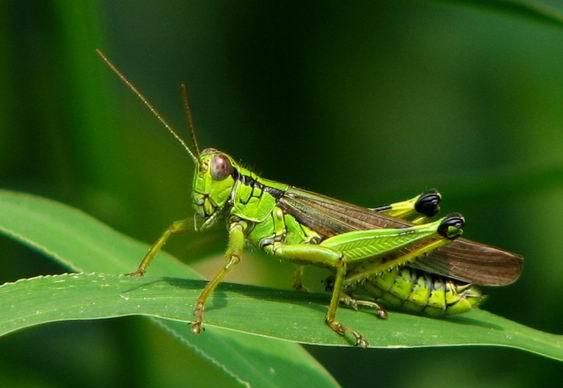Locusts, an agricultural pest commonly known as "grasshoppers", frequently caused disasters in ancient China. Once a locust plague occurs, locusts will overwhelm the ground, and there will be no grass everywhere they go, and it is common for crops to have no harvest, which will lead to food shortages and cause famine and war. Therefore, people tend to "talk about locust discoloration".

But did you know that in ancient times, even if people encountered locust plagues, they did not dare to kill locusts easily? Why?
Originally, since the Han Dynasty, under the influence of Dong Zhongshu's "heavenly induction", people believed that there were locust gods in the heavens. The locust plague occurs because humans have done something wrong, and the locust god punishes mankind. If the locusts are killed at this time, it will anger the locust gods and lead to more severe punishments. Therefore, whenever a locust plague occurs, the emperor will take the initiative to issue an "edict for his own sins", admit the mistakes of governance, and ask the locust god for forgiveness; the people will set up altars, burn incense and pray, hoping that the locust god will bless the people and pray that the locusts will stay away from the crops.
Obviously, these practices are of little use.
In 716, the fourth year of the tang dynasty, a rare locust plague occurred in the Shandong region. As in the past, the common people had no choice but to set up altars to worship the locust god, allowing the locusts to chew on large crops. When Yao Chong, the famous minister of the Tang Dynasty, saw this, he was worried and wrote to the imperial court, suggesting that the locusts be hunted and killed by burning and digging pits to fill in landfills. Emperor Xuanzong of Tang accepted his suggestion and sent Yushi as a locust hunting envoy to various places to supervise the killing of locusts.
However, many officials opposed the killing of locusts, represented by Lu Huaishen, the superintendent of the Yellow Gate, and Ni Ruoshui, the assassin of Bian Prefecture, who believed that the locust plague was a natural disaster, that killing too many insects would hurt heaven and earth, and that only xiu de could eliminate natural disasters. Yao Chong engaged in a heated argument with them and refuted their claims. In the end, at Yao Chong's insistence, Shandong and other places began to kill locusts on a large scale, minimizing the losses caused by the locust plague.
Not every dynasty has Yao Chong. After the Tang Dynasty, the so-called "locust god" was still popular both officially and privately. People are no longer limited to worshipping the locust god during the locust plague, but also established many locust temples throughout the country, "institutionalizing" the worship behavior, and forming a complete set of systematic sacrifice systems.
The Qing Dynasty literary scholar Pu Songling wrote a story about the locust god in "Liaozhai Zhiyi":
In the last years of the Ming Dynasty, Yishui, Shandong, was about to face the scourge of locusts, and the county commander was very worried. One day, after the county order went to sleep, he dreamed of Xiucai wearing a green dress. Green-clad Xiucai told the county order that the next day a woman came from the southwest on a donkey, and she was the god of locusts. If you plead with her bitterly, you may be spared the plague of locusts. The next day, the county order waited for a long time in the south of the city, and sure enough, he met the woman riding a donkey.
According to the instructions of the green-robed Xiucai, the county order begged the woman: "Our county is too small and too poor, please raise your hands high." The woman was furious: "Liu Xiucai is so hateful that he dares to divulge the heavenly opportunity!" I'm going to make him suffer the consequences and not damage the crops anymore. ”
Later, locusts flew all over the sky, but instead of stopping in the rice fields, they all flew to the willow trees and ate the willow leaves. The county suddenly realized this time: the green-clad xiucai is the god of willow trees.
By the time of the Qing Dynasty, people still believed in the god of locusts. When the plague of locusts is already so severe that they have to hunt and kill locusts, people must also pray in advance and ask the locust god for forgiveness. In this way, it inevitably affects the timing and makes the locust plague more and more intense.
The Qianlong Emperor had been exposed to foreign scientific knowledge such as astronomy, calendar, and geometry, and was somewhat scientific and culturally literate, and did not believe in the locust god's statement. At one point, he also decreed: "Those tedious prayers and worship rituals are useless, and it is only right for everyone to catch locusts in a hurry." ”
In 1745, the Qianlong Emperor banned the worship of the locust god and ordered the demolition of the locust temple. However, although the Locust Temple disappeared, there were more General Liu Meng Temple, Pu Temple, Nong Temple, Three Emperors Temple, liang zhu temple - their names are different, but their function and nature are still worshipping the locust god.